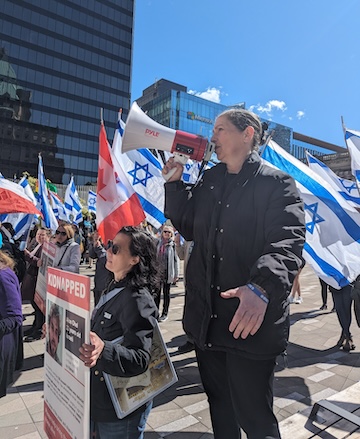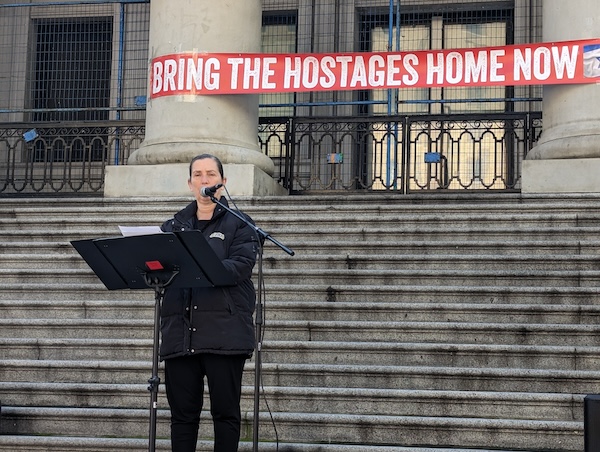Daphna Kedem speaks at one of the weekly rallies she organizes to unite the local community and express solidarity with the Israeli hostages being held by Hamas (photo by Pat Johnson)
Until recently, Daphna Kedem was a single mom with two jobs, an Israeli-Canadian who came to Vancouver in 2011. Upset by political and social developments in her homeland, she mobilized a local branch of the global activist movement UnXeptable. Then, on Oct. 7, driven by grief and an inability to sit idly, she became the face of weekly vigils for Israel’s hostages, terror victims and families.
UnXeptable is, according to its website, “a grassroots movement launched by Israeli expats in support of a democratic Israel.” The group mobilized around the world against the “judicial reforms” of the current government, which critics say would fundamentally undermine the democratic nature of the state.
The Vancouver activists were meeting weekly and, in the hours after the Oct. 7 terror attacks, it was immediately evident that there was a need for people to come together. Community organizations, she said, were waiting until the close of Shabbat to announce a community response.
“I said, no, we can’t wait,” Kedem told the Independent. “In the Jewish tradition, a war or a crisis like this is beyond Shabbat. You can actually break Shabbat if it’s very important.”
In her capacity as an individual – not on behalf of UnXeptable or any other organization – Kedem brought the community together at the Vancouver Art Gallery on Oct. 9 and has continued, with a few exceptions, at that location every Sunday since. (Conflicting events have resulted in shifting locations a few times and there were no rallies on Dec. 24 or 31.)
Kedem doesn’t recall specifically making the decision to hold a weekly event, nor would she have imagined it would go on so long.
“I don’t know how it came about but I just said, let’s do this every Sunday at 2 p.m. until all the hostages are released and, unbelievably, we are here six months after,” she said.
Kedem works for a Vancouver company specializing in products for chiropractors, massage therapists and other medical professionals, and she is also an entrepreneur who bakes pies and sells them at farmer’s markets. The weekly rallies have become effectively a third job. On top of all this, she is also deeply committed to animal rights, being a local organizer for a California-based global animal movement called Direct Action Everywhere.

Kedem laments that attendance at the rallies has dropped off – it is challenging to keep audiences engaged week after week. She notes that she hears some people in the community talking worriedly about the size of anti-Israel rallies, but then does not see those faces at her Sunday gatherings.
“For me, it should not happen because it’s like saying we are giving up on the hostages,” she said of the declining numbers. “It’s like saying this is our new normal, and it shouldn’t be this way.”
Kedem, who was born and raised in Israel, lived in London, England, in her 20s. When she decided she and her daughter, who is now a student at Western University, in Ontario, needed a change, she considered Berlin, which has a large Israeli expat community, but decided an English-speaking city would be better. Her experience of London had been one of bigoted locals with unwelcoming attitudes toward “bloody foreigners” and she is not enamoured of the political climate in the United States. Australia and New Zealand seemed too far away.
“I had friends that were moving to Vancouver and I said, OK, I can get a tourist visa for a year and, if things don’t work out, we can always have an experience of a year in Canada,” she said. “That’s how it started.”
Bringing the community together on behalf of Israeli hostages, victims of terror and their families takes effort and volunteers, Kedem said, but it is also a vital source of empowerment and comfort for her and all who attend.
“It’s necessary that we unite in common as a community,” she said. “It is for the solidarity with the hostages but the other thing is just being together, the community in Vancouver. People need to feel a part of something and, for the past six months, it has been created. People find a safe space and a safe space can grow with more people coming out.”
Kedem has a lot on her plate. Rather than adding to her stress, though, the weekly rallies are a comfort. She said, “It’s helping me because I have to do something.”

